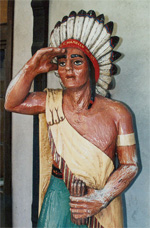
The Cigar store Indian or Wooden Indian is an old advertisement figure made to represent cigar shops, much like barber poles advertise barber shops or the three gold balls of the pawn shop. The figures were often three-dimensional wooden sculptures several feet tall - up to life-sized. They are still occasionally used for their original advertising purpose but are more often seen in decorative uses, or, for older ones, as advertising collectibles.
History
Because of the general illiteracy of the populace, early store owners used descriptive emblems or figures to advertise their shops' wares. Indians and tobacco had always been associated because Indians introduced tobacco to Europeans, and the depiction of native people on smoke-shop signs was inevitable. As early as the seventeenth century, European tobacconists used figures of Indians to advertise their shops. Because European carvers had never seen a Native American, these early cigar-store "Indians" looked more like black slaves with feathered headdresses and other fanciful, exotic features. These carvings were called "Black Boys" or "Virginians" in the trade. Eventually, the European cigar-store figure began to take on a more "authentic" yet highly stylized native visage, and by the time the smoke-shop figure arrived in the Americas in the early eighteenth century, it had become thoroughly "Indian."
Male or Female
The early cigar store Indians could be purchased as either male or female and were fashioned both in wood and cast iron. In the early years the female figure (with or without papoose) was by far the more popular, outnumbering male figures four to one. Occasionally, the female figure was adorned with a headdress of tobacco leaves in place of the more standard feathers. Male figures were often dressed in the warbonnets of the Plains Indians.
Today
The cigar store Indian became less common in the 20th century for a variety of reasons. New sidewalk-obstruction laws, higher manufacturing costs, and increased racial sensitivity relegated the figures to museums and antique shops. To some, the cigar store Indian is considered the native equivalent of the black lawn jockey—a stereotypical and thus demeaning portrayal of Native Americans; however, both of these types of figures are still made for sale and cigar store Indians can still be found outside some cigar stores.
